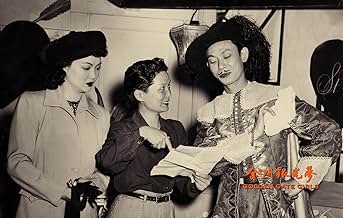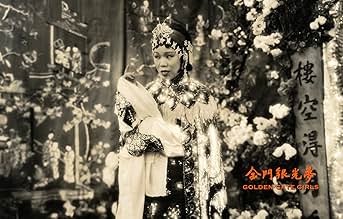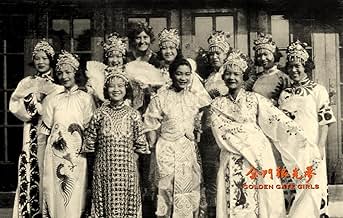The documentary explores Esther Eng's life and work alongside Anna May Wong and Dorothy Arzner, pioneering women filmmakers who broke barriers in the industry, highlighting their contributio... Read allThe documentary explores Esther Eng's life and work alongside Anna May Wong and Dorothy Arzner, pioneering women filmmakers who broke barriers in the industry, highlighting their contributions to cinema across cultural and gender lines.The documentary explores Esther Eng's life and work alongside Anna May Wong and Dorothy Arzner, pioneering women filmmakers who broke barriers in the industry, highlighting their contributions to cinema across cultural and gender lines.
Featured reviews
This documentary is remarkable in its standalone coverage of the largely forgotten legacy of Esther Eng, the first woman to direct Chinese-language films in the United States. Whilst furthering the representation of Chinese-Americans and Chinese-American culture in the early 1900s, the most impressive is the meticulous research that Wei conducted to reconstruct Eng's career. Assembling archival footage and materials that have never been seen before, Wei even directly follows the places that Eng used to haunt. As Eng was a pioneering figure in both Hollywood and Hong Kong cinematic circles, we can see clearly the racial and gender barriers that Eng defied at a time when opportunities for women, let alone Chinese women, were virtually nonexistent. By weaving in her story with those of more well known names such as Dorothy Arzner and Anna May Wong, Wei contextualizes the broader struggles and achievements of women and minorities in early cinema. Hunting down those who knew Eng personally and using testimonials and interviews to create a sensitive and scholarly documentary, I felt that lost history was being recovered. With a collage-esque style that I sometimes found patchy, Wei nevertheless restores Eng to her rightful place in film history. I think that this is essential viewing for anyone interested in Asian American studies or film history, as Golden Gate Girls is a deeply moving tribute to the pioneers of the screen today.
By excavating Esther Eng's legacy in film, Golden Gate Girls inspires a greater discourse on the forgotten parts of cinematic history. As a viewer, I was struck by the depth of Wei's research; the film takes us on a journey through film snippets, interviews, and archive pictures and what emerges is a tender portrait dedicated to a woman whose artistic imprint may otherwise be lost to history. It was very disheartening to see how little even Eng's friends and family knew of her work, exposing how the Western, male dominated world of film erases the contributions of queer people, people of colour, and women. I was especially moved to learn that Eng co-wrote It's a Woman's World (an all-female cast film) decades ahead of its time.
Louisa Wei beautifully fills gaps in feminist filmmaking history by detailing the life and works of Esther Eng, an openly queer woman of color in the filmmaking industry in the mid-20th century. Hollywood turned their backs on Esther, and all but one of her films have been lost to time, but Golden Gate Girls reveals a portrait of a determined and talented woman filmmaker in Esther Eng. One particularly haunting aspect of the film was the existential horror provoked when the filmmaker struggled to find any surviving friends or family members of Esther's. Stories about Esther Eng's film reels ending up in dumpsters, discarded and forgotten, prompt questions about who decides which films and filmmakers exist forever in cultural memory, and which people history chooses to forget.
Golden Gate Girls is a documentary by S. Louisa Wei about the filmmaking journey of Esther Eng. I've never heard of the name "Esther Eng" before, and this film introduced me to her. She was a remarkable filmmaker who was a woman of color and openly queer in a time where it was difficult to be either. Esther Eng was almost completely forgotten, where most of her films and works are lost and didn't survive archival. This documentary consolidates a decade worth of research Wei performed on Esther, preserving her legacy and carving a name for her in history.
The documentary is well-paced and also includes the lives of industry leaders: actress Anna May Wong and fellow filmmaker Dorothy Arzner. This kept the film interesting and made it more dynamic, where the viewers would compare and contrast the successes of these women. It seems to me Esther Eng faced a lot of unfairness and discrimination in the industry, where she was often overlooked just for her minority identity. Arzner was also openly gay and Anna May Wong was also Asian American, but Ester Eng got the short end of the stick and was least recognized for her talent.
Wei takes us through discovering bits and pieces of Esther's life, making it super engaging and like we were in the research process with her uncovering lost histories. The theatricized voiceovers and readings of quotes made Ester Eng come to life, which made her more memorable to me.
I've learned a lot about a woman I would have otherwise known nothing about. Best documentary I've seen so far!
The documentary is well-paced and also includes the lives of industry leaders: actress Anna May Wong and fellow filmmaker Dorothy Arzner. This kept the film interesting and made it more dynamic, where the viewers would compare and contrast the successes of these women. It seems to me Esther Eng faced a lot of unfairness and discrimination in the industry, where she was often overlooked just for her minority identity. Arzner was also openly gay and Anna May Wong was also Asian American, but Ester Eng got the short end of the stick and was least recognized for her talent.
Wei takes us through discovering bits and pieces of Esther's life, making it super engaging and like we were in the research process with her uncovering lost histories. The theatricized voiceovers and readings of quotes made Ester Eng come to life, which made her more memorable to me.
I've learned a lot about a woman I would have otherwise known nothing about. Best documentary I've seen so far!
Golden Gate Girls (2013) is an ambitious documentary directed by S. Louisa Wei, focused on highlighting Esther Eng's films and life works that were essentially erased from history. The film spoke about Eng's story but also put her life within a broader context of female filmmaking and Asian-American cultural history. However, in my opinion, because the film attempted to provide biographical and historical context, it also ends up detracting from Eng's narrative at the end.
One of the most controversial choices Wei makes is the inclusion of the significant screen time dedicated to Dorothy Arzner and Anna May Wong. I understand why Wei chose to do this as both Dorothy Arzner and Anna May Wong were trailblazers in the film industry, and to properly frame Eng's story within the marginalized film pioneers during that time, it was needed to compare their accomplishments and show how little is known about Eng compared to how much is known about Arzner and May Wong. It helped emphasize how special Eng's accomplishments were, especially considering she was female, Chinese, and queer. However, this contextualization also came at a cost. I think the amount of time spent on this context also drew away the film's focus. Instead of deepening the viewer's understanding of Eng, I walked away from the film remembering more of Anna May Wong's and Dorothy Arzner's life. This is also especially because Eng had so few archival photos and graphics left now.
Ultimately, Golden Gate is an important work of recovery and does give the spotlight to a figure that has been unjustly erased form history. However, I don't particularly agree with the techniques to frame Esther Eng's life.
One of the most controversial choices Wei makes is the inclusion of the significant screen time dedicated to Dorothy Arzner and Anna May Wong. I understand why Wei chose to do this as both Dorothy Arzner and Anna May Wong were trailblazers in the film industry, and to properly frame Eng's story within the marginalized film pioneers during that time, it was needed to compare their accomplishments and show how little is known about Eng compared to how much is known about Arzner and May Wong. It helped emphasize how special Eng's accomplishments were, especially considering she was female, Chinese, and queer. However, this contextualization also came at a cost. I think the amount of time spent on this context also drew away the film's focus. Instead of deepening the viewer's understanding of Eng, I walked away from the film remembering more of Anna May Wong's and Dorothy Arzner's life. This is also especially because Eng had so few archival photos and graphics left now.
Ultimately, Golden Gate is an important work of recovery and does give the spotlight to a figure that has been unjustly erased form history. However, I don't particularly agree with the techniques to frame Esther Eng's life.
Details
Box office
- Budget
- HK$800,000 (estimated)
- Runtime
- 1h 30m(90 min)
- Color
Contribute to this page
Suggest an edit or add missing content











